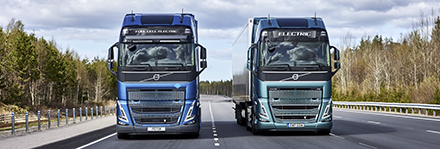Australia’s archaic road rules, and its unique weight restrictions on trucks, have emerged as a major stumbling block to moves to transform the country’s heavy duty truck fleet to fully electric. Source: The Driven
Volvo Trucks, the world’s biggest maker of heavy-duty electric trucks, and Australia’s biggest vehicle manufacturer, wants to start selling its heavy-duty electric trucks now and to build them at its Wacol factory near Brisbane from 2027 but says arbitrary weight limits stand in its way.
The weight rules – unique in the world – put a 6.5 tonnes limit on the front axle of the truck’s prime mover, ostensibly to protect Australian roads. Volvo says this makes it impossible to load enough batteries to where they are needed. They want it lifted to at least 7.5 tonnes.
And ironically, even an empty heavy duty electric truck, which normally weighs up to 44 tonnes when the trailer is fully loaded, would not be allowed on Australian roads under current rules.
Volvo has sold more than 5,000 electric trucks and is the first in the world to build heavy duty electric trucks at scale. It has brought in its first FH heavy duty electric truck to Australia, in time for the Brisbane Truck Show – the industry’s flagship event – but can only drive it on local council roads, and not the freeway, after getting special permission.
“This is the biggest transformation ever,” Roger Alm, the head of the Swedish truck maker said a launch event at Wacol. Volvo claims 50% of the electric truck market in both Europe and the US and has set a target of lifting electric trucks to half of its production by 2030, and 100% by 2040.
But despite 18 months of talks, and agreement from other trucking companies and the industry’s main lobby group there has been little or no movement on the weight limit problem, and it was not even mentioned in the National Electric Vehicle strategy released late last month by the federal government.
“The barrier we have right now is legislation,” the head of Volvo Group in Australia, Martin Merrick said. “If we don’t get legislation change, then we won’t meet these targets. Everyone feels it should be done, it is just taking time.”
The weight issue is not the only barrier. Volvo is seeking an extension to the allowable width of trucks in Australia from 2.5 to 2.55 metres to allow for its battery design. It is thought this is less complicated measure than the weight limits, which are subject to state and local government approval.
Mr Alm says shifting heavy duty trucks is significant because they account for 7% of total emissions on a global scale, and each diesel truck emits more than 50 times the emissions of a passenger car. In Europe, things are moving fast because local governments are banning fossil fuel vehicles, and national governments are setting ambitious climate targets.
“We expect a massive shift to zero emissions,” Mr Alm said. “It will happen sector by sector, country by country and market to market. We now have more than 1,000 customers that have bought electric trucks. The feedback that we have received is really really positive. Many have said they have bought their last diesel truck.
“By 2040, all trucks we sell will be net zero emissions. This is necessary to deliver on the Paris climate agreement. It is an ambitious task, and we are so very determined to reach this and to be leader in this transition.”
Mr Alm says the company is also working on fuel cell hydrogen trucks, and is currently testing them in Sweden and within the Arctic Circle, but says serial production is not likely to happen until the end of the decade. The fuel cell trucks, with range of 1,000kms, will also be tested in Australia, but Mr Alm declined to say when.
Volvo is also investing in battery cell manufacturing and sees opportunities in using truck batteries, which will be sized up to 500kWh, as stationary storage, and can also be recycled. Volvo is also the first electric truck manufacturer to use fossil free steel in its products.








